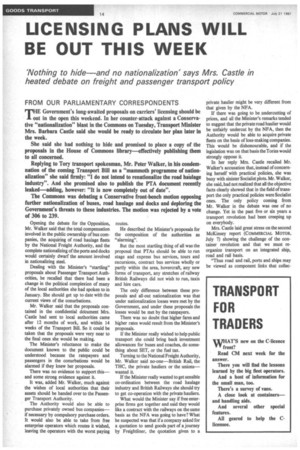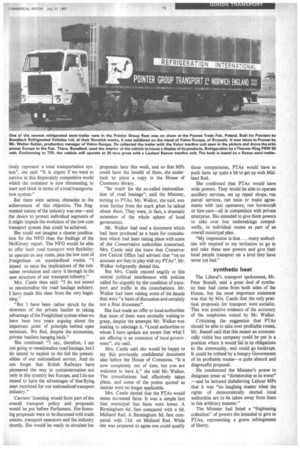LICENSING PLANS WILL BE OUT THIS WEEK
Page 16

Page 17

If you've noticed an error in this article please click here to report it so we can fix it.
'Nothing to hide—and no nationalization' says Mrs. Castle in heated debate on freight and passenger transport policy
FROM OUR PARLIAMENTARY CORRESPONDENTS
rGovernment's long-awaited proposals on carriers' licensing should be miiE t in the open this weekend. In her counter-attack against a Conservative "nationalization" blast in the Commons on Tuesday, Transport Minister Mrs. Barbara Castle said she would be ready to circulate her plan later in the week.
She said she had nothing to hide and promised to place a copy of the proposals in the House of Commons library—effectively publishing them to all concerned.
Replying to Tory transport spokesman, Mr. Peter Walker, in his condemnation of the coming Transport Bill as a "mammoth programme of nationalization" she said firmly: "I do not intend to renationalize the road haulage industry". And she promised also to publish the PTA document recently leaked—adding, however: "It is now completely out of date".
The Commons was debating a Conservative front-bench motion opposing further nationalization of buses, road haulage and docks and deploring the Government's threats to these industries. The motion was rejected by a vote of 306 to 239.
Opening the debate for the Opposition, Mr. Walker said that the total compensation involved in the public ownership of bus companies, the acquiring of road haulage fleets by the National Freight Authority, and the complete nationalizing of the ports and docks would certainly dwarf the amount involved in nationalizing steel.
Dealing with the Minister's "startling" proposals about Passenger Transport Authorities, he recalled that there had been a change in the political complexion of many of the local authorities she had spoken to in January. She should get up to date with the current views of the conurbations.
Mr. Walker said that the proposals contained in the confidential dcicument Mrs. Castle had sent to local authorities came after 12 months of work, and within 14 weeks of the Transport Bill. So it could be taken that the proposals were very near to the final ones she would be making.
The Minister's reluctance to make the document known to the public could be understood because the ratepayers and passengers in the conurbations would be alarmed if they knew her proposals.
There was no evidence to support this— and some strong evidence against it.
It was, added Mr. Walker, much against the wishes of local authorities that their assets should be handed over to the Passenger Transport Authority.
The Authority would also be able to purchase privately owned bus companies— if necessary by compulsory purchase orders. It would also be able to take from free enterprise operators which routes it wished, leaving the operators with the worst paying routes.
He described the Minister's proposals for the composition of the authorities as "alarming".
But the most startling thing of all was the proposal that PTAs should be able to run stage and express bus services, tours and excursions, contract bus services wholly or partly within the area, hovercraft, any new forms of transport, any stretches of railway British Railways did not wish to run, taxis and hire cars.
The only difference between these proposals and all-out nationalization was that under nationalization losses were met by the Government, and under these proposals the losses would be met by the ratepayers.
There was no doubt that higher fares and higher rates would result from the Minister's proposals.
If the Minister really wished to help public transport she could bring back investment allowances for buses and coaches, do something about SET, or the fuel tax.
Turning to the National Freight Authority, Mr. Walker said no-one—British Rail, the THC, the private hauliers or the unions— wanted it.
If the Minister really wanted to get sensible co-ordination between the road haulage industry and British Railways she should try to get co-operation with the private hauliers.
What would the Minister say if free enterprise firms got together and said they would like a contract with the railways on the same basis as the NFA was going to have? What he suspected was that if a company asked for a quotation to send goods part of a journey by Freightliner, the quotation given to a private haulier might be very different from that given by the NFA.
If there was going to be undercutting of prices, and all the Minister's remarks tended to suggest that the private road haulier would be unfairly undercut by the NFA, then the Authority would be able to acquire private fleets on the basis of loss-making companies. This would be dishonourable, and if the legislation was on that basis the Tories would strongly oppose it.
In her reply Mrs. Castle recalled Mr. Walker's accusation that, instead of concerning herself with practical policies, she was busy with sinister Socialist plots. Mr. Walker, she said, had not realized that all the objective facts clearly showed that in the field of transport the only practical policies were Socialist ones. The only policy coming from Mr. Walker in the debate was one of no change. Yet in the past five or six years a transport revolution had been creeping up on everybody.
Mrs. Castle laid great stress on the second McKinsey report (COMMERCIAL MOTOR, July 7) showing the challenge of the container revolution and that we must reorganize transport on an integrated ship, road and rail basis.
"Thus road and rail, ports and ships may be viewed as component links that collec tively represent a total transportation system", she said. "It is urgent if we want to survive in this desperately competitive world which the container is now threatening, to start and think in terms of a total transportation system."
But there were serious obstacles to the achievement of this objective. The fragmented nature of the industry was one—and the desire to protect individual segments of it might impede the evolution of the low-cost transport system that could be achieved.
She could not imagine a clearer justification for the NFO than the findings of the McKinsey report. The NFO would be able to offer both road transport with flexibility to operate on any route, plus the low cost of Freightliner on standardized routes. "I intend to seize the implications of the container revolution and carry it through in the new structure of our transport industry."
Mrs. Castle then said: "I, do not intend to renationalize the road haulage industry. I have made this clear from the very beginning."
"But I have been rather struck by the slowness of the private haulier in taking advantage of the Freightliner system when we have been two years arguing about the important point of principle behind open terminals. We find, despite the economies, private hauliers hanging back."
She continued: "I say, therefore, I am not going to renationalize road haulage, but I do intend to exploit to the full the potentialities of our nationalized service. And do, not forget that British Railways have pioneered the way in containerization not only in this country but Europe, and I do not intend to have the advantages of that flying start restricted for our nationalized transport industry."
Carriers' licensing would form part of the overall transport policy and proposals would be put before Parliament. Her licensing proposals were to be discussed with trade unions, transport operators and the industry shortly. She would be ready to circulate her proposals later this week, and so that MPs could have the benefit of them, she undertook to place a copy in the House of Commons library.
"So much for the so-called nationalization of road haulage", said the Minister, turning to PTAs. Mr. Walker, she said, was even further from the mark when he talked about them. They were, in fact, a dramatic extension of the whole sphere of local government.
Mr. Walker had read a document which had been produced as a basis for consultation which had been taking place with some of the Conservative authorities concerned. Mrs. Castle said she knew that Conservative Central Office had advised that "on no account are they to play with my PTAs". Mr. Walker indignantly denied this.
But Mrs. Castle reacted angrily to this central political interference with policies called for urgently by the condition of transport and traffic in the conurbations. Mr. Walker had been raising some of the details that were "a basis of discussion and certainly not a final document".
She had made an offer to local authorities that most of them were excitedly waiting to grasp, despite the attempts Mr. Walker was making to sabotage it. "Local authorities to whom I have spoken are aware that what I am offering is an extension of local government", she said.
Mrs. Castle said she would be happy to lay this previously confidential document also before the House of Commons. "It is now completely out of date, but you are welcome to have it," she told Mr. Walker. The consultations had effectively taken place, and some of the points quoted as sinister were no longer applicable.
Mrs. Castle denied that the PTAs would mean increased fares. It was a simple fact that municipal bus fares were lower. A Birmingham 4d. fare compared with a 6d. Midland Red. A Birmingham 8d. fare compared with I Id. on Midland Red. While she was prepared to agree one could qualify those comparisons, PTAs would have to push fares up quite a bit to get up with Midland Red.
She confirmed that PTAs would have wide powers. They would be able to operate ancillary services, set up repair shops, run parcel services, run taxis or make agreements with taxi operators, run hovercraft or hire-cars—all in competition with private enterprise. She intended to give them powers to take over bus undertakings compulsorily, or individual routes as part of an overall municipal plan.
"My impression is that ... many authorities will respond to my invitation to go in and take these new powers and give their local people transport on a level they have never yet had."
synthetic heat
The Liberal's transport spokesman, Mr. Peter Bessell, said a great deal of synthetic heat had come from both sides of the House, but the most important statement was that by Mrs. Castle that the only practical proposals for transport were socialist. This was positive evidence of the accuracy of the suspicions voiced by Mr. Walker.
Criticising the suggestion that PTAs should be able to take over profitable routes, Mr. Bessell said that this meant an economically viable bus company could be put in a position where it would fail in its obligations to the community, and could go bankrupt. It could be robbed by a hungry Government of its profitable routes—a quite absurd and disgraceful proposal.
He condemned the Minister's power to designate areas as "dictatorship at its worst" —and he lectured disbelieving Labour MPs that it was "no laughing matter when the rights of democratically elected local authorities are to be taken away from them in this arbitrary manner."
The Minister had listed a "frightening collection" of powers she intended to give to PTAs, representing a grave infringement of liberty.












































































































